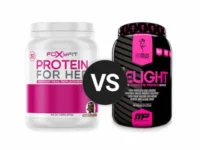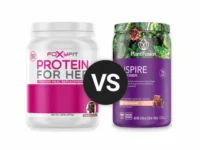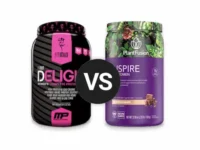Knowledge BaseYou're Questions Answered
BACK
Are there protein powders that are better suited for women?
While protein needs do not differ drastically between men and women, women often have unique nutritional needs that can be supported by specific protein powder formulations. Here’s what to consider when choosing a protein powder best suited for women.
Key Nutritional Needs of Women
- Bone Health: Women are at higher risk of osteoporosis and may benefit from additional calcium and vitamin D, which can be included in some protein powders1.
- Iron Intake: Women of reproductive age have higher iron requirements, and some protein powders contain added iron to help meet these needs2.
- Muscle Maintenance: Maintaining lean muscle mass is important for women as they age. High-quality protein can help support muscle maintenance and repair, especially when combined with resistance training3.
- Weight Management: Protein powders can aid in weight management by increasing satiety and reducing overall calorie intake, which can be particularly beneficial for women looking to achieve or maintain a healthy weight4.
Protein Powders Suited for Women
- Whey Protein: Whey protein is a complete protein that contains all essential amino acids, including a high concentration of branched-chain amino acids (BCAAs). This makes it ideal for muscle growth and recovery. Look for low-calorie, low-fat formulations with added vitamins and minerals5.
- Plant-Based Protein: Plant-based proteins like pea, rice, and hemp are excellent options for women with lactose intolerance or dietary restrictions. They are also rich in antioxidants and phytonutrients that can support overall health. Some formulations include added calcium and iron6.
- Collagen Protein: Collagen protein is known for its potential benefits for skin, hair, and joint health, making it particularly appealing for women. While not a complete protein, it can be a valuable addition to a balanced diet7.
- Protein Blends: Some protein powders blend different types of protein to offer a complete amino acid profile and additional nutrients like fiber, probiotics, and omega-3s to support overall wellness.
Tips for Choosing the Right Protein Powder
- Check Nutrient Content: Look for formulations that include added vitamins and minerals like calcium, vitamin D, iron, and magnesium.
- Review Ingredient Lists: Avoid protein powders with excessive added sugars, artificial sweeteners, or unnecessary fillers.
- Consider Your Goals: Choose a protein powder that aligns with your specific health goals, whether it's muscle building, weight management, or overall wellness.
Ultimately, the best protein powder for women depends on individual needs and preferences. Opt for high-quality protein powders that provide added nutritional benefits and fit into your overall dietary and fitness goals.
Was this answer helpful? Let us know!
Like
References:
- National Osteoporosis Foundation. (2022). Osteoporosis in Women.
- Institute of Medicine. (2001). Dietary Reference Intakes for Vitamin A, Vitamin K, Arsenic, Boron, Chromium, Copper, Iodine, Iron, Manganese, Molybdenum, Nickel, Silicon, Vanadium, and Zinc. National Academies Press.
- Phillips, S. M. (2014). A brief review of higher dietary protein diets in weight loss: a focus on athletes. Sports Medicine, 44(S1), S149-S153.
- Leidy, H. J., Clifton, P. M., Astrup, A., Wycherley, T. P., Westerterp-Plantenga, M. S., Luscombe-Marsh, N. D., ... & Mattes, R. D. (2015). The role of protein in weight loss and maintenance. The American Journal of Clinical Nutrition, 101(6), 1320S-1329S.
- Kerksick, C., & Smith-Ryan, A. (2020). Nutrient timing: What and when to eat for performance, health, and recovery. International Journal of Sport Nutrition and Exercise Metabolism, 30(6), 485-497.
- Joy, J. M., Lowery, R. P., Wilson, J. M., Purpura, M., De Souza, E. O., McDonnell, A., ... & Wilson, S. (2013). The effects of 8 weeks of whey or rice protein supplementation on body composition and exercise performance. Nutrition Journal, 12(1), 86.
- Postlethwaite, A. E., Seyer, J. M., & Kang, A. H. (1978). Chemotactic attraction of human fibroblasts to type I, II, and III collagens and collagen-derived peptides. Proceedings of the National Academy of Sciences, 75(2), 871-875.
Add to this Answer
Related Questions
Related Reviews
Your Answer
Do you have a suggestion to improve the answer? Please detail your suggestions and provide any references to information that may support your answer if available.
The content on this site has not been written, reviewed or endorsed by a medical professional. We assume no liability for the misuse of supplements and recommend you review the label of any product, as well as consulting with your health care professional.
We are a participant in the Amazon Services LLC Associates Program, an affiliate advertising program designed to provide a means for us to earn fees by linking to Amazon.com and affiliated sites.
We are a participant in the Amazon Services LLC Associates Program, an affiliate advertising program designed to provide a means for us to earn fees by linking to Amazon.com and affiliated sites.
© 2025 ProteinPowder.com



